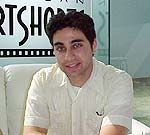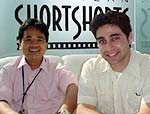|
|
 |
 |



For a graduation project at film school, David Greenspan boldly took on the challenge of making a film set in Japan during the 1930's. The resulting film recently won the Palme d'Or at the Cannes Film Festival.
David spent some time studying in Kyoto during his University years, and he is something of an expert on Japan.
Following is our exclusive interview with the director, here in Japan especially for the American Short Shorts Film Festival, and his leading actor, Ryuichi Miyakawa, on the stories behind the scenes.



[DAVID GREENSPAN]
- What first sparked your interested in Japan?

 |
 |
When I was little, I loved comic books, and in them Ninjas appeared frequently. I even wrote a paper on Ninjas when I was in 6th grade. At Harvard University, I majored in Economics but at the same time I took classes in the department of Oriental Studies where I studied Japanese Literature, History and Language. In Kyoto there was this center for foreign students that my University had ties with, so I went to Kyoto to study Japanese History.
|
- When did you decide that you wanted to make films?

Right after I entered University, so around 1991. I started thinking about film because studying economics was boring (laugh). And after I graduated and worked a little, I entered a film school. My job was editing videos.
When I was studying in Kyoto, I met a lot of people in the film circle at Kyoto University where I met Atsushi. He was the producer on Ohagi.
Before I made Ohagi, the members of the film circle and I filmed a movie called Black. I directed and Atsushi translated the script. There, we promised each other that we would take part in the film industry, the world of films.
|
 |

|
Black was about a tall blonde American who wanted to look Japanese and searched for a school uniform. The film mirrored my own experience and feelings. I myself, when I was living here, tried hard to adapt to Japan and be Japanese.
(Atsushi)
David returned to America, but in 1996, he came back to Japan for 3 months for his job. During that time, I was going through a difficult time since I had just stopped working at my job at an advertisement agency. So there was this talk about making a film together. I decided to go to the States, and David helped me pack (laugh).
- What was most difficult in filming Ohagi?

The most difficult thing was finding locations. It took me about 2 months to find a suitable school. The school we finally decided on was in a suburb of Los Angeles called Pasadena. The building itself was very antique and splendid. Just putting up labels and scriptures in Japanese made it look like "Japan."
The Production manager said that in a school in Japan the ceiling would be a little lower, but with the limited amount of time and money we had, it was hard to faithfully create the atmosphere of the 30's. As long as it didn't change the story line, we had to be prepared to compromise on some of the smaller details. I feel that I did my best under difficult circumstances.
At the last minute, we had to switch the classroom because in the first room I chose, the noise of the traffic outside was distracting. This was after all the props had been set up and we were almost ready to start shooting, so we had to move everything really quickly. But because we moved we didn't have to take so much time in post-production editing the sound, so I guess the outcome was good.
- Since you received an award at the Cannes, is anything different?


|
 |
Everyone thought that after receiving the award that I was going to change mentally but I didn't. I got a lot of phone calls from friends that I had been losing touch with who called to congratulate me.
I became really busy, but I still have an office job. After shooting Ohagi, I couldn't find work, but a friend who works at a computer company told me about this job where I make the "intro movie" for game software.
|
After receiving the award, a famous American movie company had said they wanted to license the film, but an exact offer has not been made. But definitely there's a difference since the last time I was here; I'm getting lots of attention now! In 1996 when I came here, Atsushi and I were in a miserable situation (laugh). Japan itself hasn't changed much, except that now everyone has a cell phone.
- Are you going to continue introducing the Japanese Culture in your films?

A Japanese friend suggested this story to me, and even if I had never visited Japan, I would probably have made a similar film. My next film is a fantasy story based on old Japanese tales or myths but set in modern Japan. For my future films I would like to keep on writing about Japan. I have lots of ideas but the stories are not yet put together. Right now I am working on an original script.
| - |
For this film you used 16-mm film, but do you think you would want to work with digital? |

What is important is the story line, so I don't think it matters if you work with film or digital. If the budget was limited and if I had to use digital, I wouldn't mind. But, for this particular film, I wanted to use film. I used non-linear editing.
| - |
Do you think short films will become established as a distinct genre of entertainment? |

On my way here, on the airplane, they were showing American Short Shorts. I think in situations like that (on an airplane) there will be more opportunity to see them. Also there's going to be more through the Internet.
- Are there any Japanese directors who influence your work?

Of course Kurosawa, but Yasujiro Ozu, or Kon Ichikawa's "Bilma no Tategoto- Harp of Burma". I like comedies so, I like "Tanpopo" of Jyuzo Itami. Also, I really like Hirokazu Koreeda, there's this art house in LA where they show a lot of Japanese films and I saw his film "Wonderful Life" there.
I also like Hayao Miyazaki's "Mimi o Sumaseba" and "Tonari no Totoro." I wanted to invoke the same nostalgic feeling in my film that Miyazaki created.
If you live in LA there're lots of chance to see foreign films. I'm interested in Japan, so I never stop looking for places where they show them. When I was in High School, I found out that the local library was showing "Kazoku Game." Itami stars in that film.
- Lastly, any messages for the future Japanese filmmakers?

The most important thing I learned in film school was "make what you like and enjoy." To everyone: don't worry about whether it'll sell or not, please make what you love and enjoy.
 |
 |
Copyright, (C) American Short Shorts Film Festival 2001. All rights reserved.
Feedback to assff2001@hotmail.com |
|
|